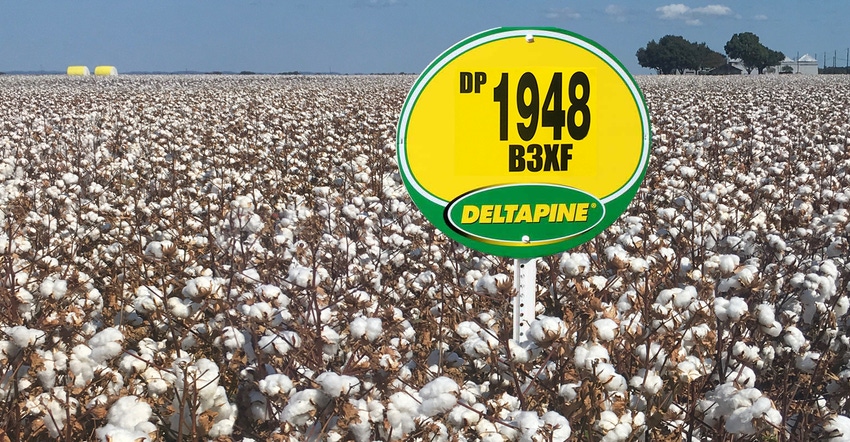January 28, 2020

Sponsored Content
On many farms across the Southwest, DP 1646 B2XF is a primary variety planted due to consistent, high-end yield and fiber quality potential. For growers looking to move toward the Bollgard® 3 XtendFlex® technology, however, the Deltapine® brand offers several varieties with that technology for planting in 2020.
Jason Wallace has an irrigated “honey-hole” field that traditionally makes good cotton on his farm in Southwestern Oklahoma. In 2019, the field was planted to DP 1646 B2XF and averaged an astonishing 2,430 lbs per acre.
“It was our best cotton, but it seems like every field you pick of DP 1646 B2XF just out-yields any other variety planted near it,” said Wallace. “But, we tried the variety DP 1948 B3XF and it looked very promising.”
DP 1948 B3XF is just one of the newer Deltapine varieties showing performance potential worthy of making them companion products to DP 1646 B2XF. Wallace conducted his own trial in 2019, planting DP 1948 B3XF on half of a center pivot circle, with the other half planted to a competitor variety. Wallace said the competitor is known for fast emergence and good vigor. While it showed those characteristics, the competitor variety had trouble keeping up with DP 1948 B3XF.
“We defoliated the field and DP 1948 B3XF showed us that it was a fuller-maturity variety and it took a bit long to get ready for picking, but the yield was very good,” he said. “DP 1948 B3XF averaged 2,075 lbs/acre. The Staple was all 38s. The turnout was over 40%, and it went into the loan at over 56 cents, so it was an outstanding variety for us in the trial."
Wallace sees DP 1948 B3XF and DP 1646 B2XF performing neck and neck on irrigated ground. In 2020, he plans to begin planting DP 1948 B3XF due to its fuller maturity, and then switch to DP 1646 B2XF.
New Technology
Sammy and Keith Floerke’s farm is headquartered in Taft, Texas, but their dryland cotton acreage is spread across four counties from just off the Gulf Coast and going upward and west toward Corpus Christi. For several years DP 1646 B2XF has been their primary variety, one that can push 3-bale cotton when late, timely rainfall is received. Plot work for the Deltapine brand in 2018 indicated to the brothers that DP 1948 B3XF could perform on their tougher, drier fields.
“That is where we planted it in 2019 and it was dry, tough conditions there and it did really well for us under those conditions when compared to DP 1646 B2XF,” said Sammy Floerke. “It out yielded the DP 1646 B2XF in those tougher locations.”
The fiber quality was very good on DP 1948 B3XF and the Bollgard 3 technology in the variety is a plus, as well, said Sammy.
“Bollgard 3 could save us a worm spray one season if we get into heavy pressure,” he said. “DP 1948 B3XF was also easier to manage in that it did not take as much PGR management as DP 1646 B2XF does. But, I think there is a place for both varieties. In 2020, we will plant DP 1948 B3XF on our fields with tougher dry conditions, and plant DP 1646 B2XF along the coast, where we get more rainfall.”
Monsanto Company is a member of Excellence Through Stewardship® (ETS). Monsanto products are commercialized in accordance with ETS Product Launch Stewardship Guidance, and in compliance with Monsanto’s Policy for Commercialization of Biotechnology-Derived Plant Products in Commodity Crops. This product has been approved for import into key export markets with functioning regulatory systems. Any crop or material produced from this product can only be exported to, or used, processed or sold in countries where all necessary regulatory approvals have been granted. It is a violation of national and international law to move material containing biotech traits across boundaries into nations where import is not permitted. Growers should talk to their grain handler or product purchaser to confirm their buying position for this product.
ALWAYS READ AND FOLLOW PESTICIDE LABEL DIRECTIONS. It is a violation of federal and state law to use any pesticide product other than in accordance with its labeling. NOT ALL formulations of dicamba or glyphosate are approved for in-crop use with cotton with XtendFlex® technology. ONLY USE FORMULATIONS THAT ARE SPECIFICALLY LABELED FOR SUCH USES AND APPROVED FOR SUCH USE IN THE STATE OF APPLICATION. May not be approved in all states. Contact the U.S. EPA and your state pesticide regulatory agency with any questions about the approval status of dicamba herbicide products for in-crop use with cotton with XtendFlex® technology.
Cotton with XtendFlex® Technology contains genes that confer tolerance to glyphosate, dicamba and glufosinate. Glyphosate will kill crops that are not tolerant to glyphosate. Dicamba will kill crops that are not tolerant to dicamba. Glufosinate will kill crops that are not tolerant to glufosinate. Contact your Bayer dealer or refer to the Technology Use Guide for recommended weed control programs.
B.t. products may not yet be registered in all states. Check with your seed brand representative for the registration status in your state.
Performance may vary from location to location and from year to year, as local growing, soil and weather conditions may vary. Growers should evaluate data from multiple locations and years whenever possible and should consider the impacts of these conditions on the grower’s fields.
Insect control technology provided by Vip3A is utilized under license from Syngenta Crop Protection Ag. LibertyLink® and the Water Droplet Design® is a trademark of BASF Corporation. Bayer, Bayer Cross Design, Bollgard II®, Bollgard®, Deltapine®, Respect the Refuge and Cotton Design®, Roundup Ready® and XtendFlex® are registered trademarks of Bayer Group. All other trademarks are the property of their respective owners. ©2020 Bayer Group. All rights reserved.
About the Author(s)
You May Also Like




